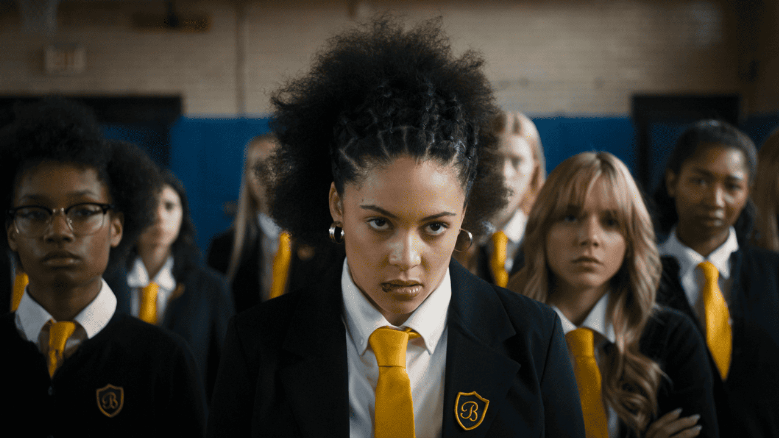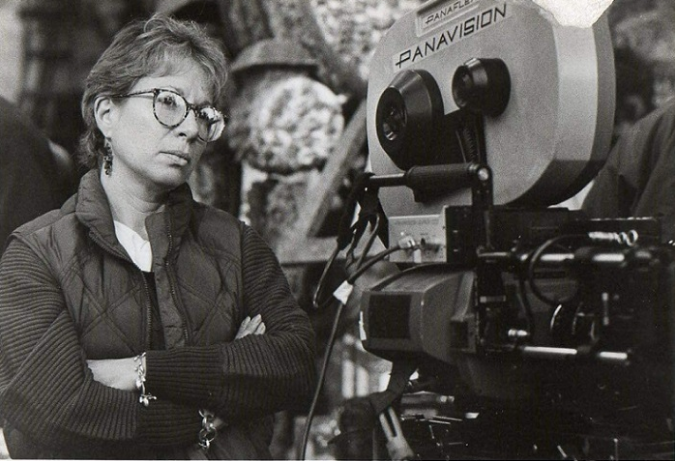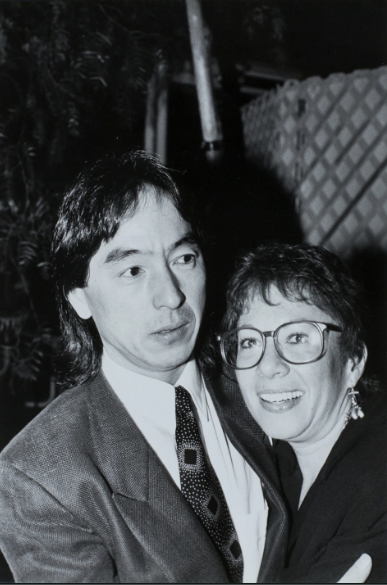(Marleen Gorris, 1982, Netherlands, rated R, 92 minutes)
Marleen Gorris's directorial debut, A Question of Silence, isn't an unknown quantity. In its home country, the film generated controversy upon its original release, and feminist film scholars are as likely to mention it today when discussing the key titles of the 1980s, alongside Lizzie Borden's 1983 Born in Flames and 1986 Working Girls.
Outside of those circles, though, it's fairly obscure. It shouldn't be, but this isn't especially surprising, because the film arrived without the involvement of Paul Verhoeven or Rutger Hauer, the Dutch film figures with whom international audiences are most likely to be familiar (to be fair, Verhoeven's Dutch work will never be as well known here as his English work either).
Known or unknown, the central cast is terrific (more on them momentarily), but the writer/director isn't quite so obscure. Nonetheless, I wasn't familiar with the 1982 film until a friend introduced me to it last year.
The weird part: I had definitely heard of Marleen Gorris. Many people have, because she won the Oscar in 1996 for the unambiguously feminist Antonia's Line, but I had no idea, at the time, that it followed more confrontational work.
After her Academy Award win, Gorris would shift to English-language films, including a very good 1997 adaptation of Virginia Woolf's Mrs. Dalloway with Vanessa Redgrave and Natascha McElhone and a less-good 2000 adaptation of Nabokov's The Luzhin Defence with Emily Watson and John Turturro.
A Question of Silence and her 1984 follow-up, Broken Mirrors, are now available on Blu-ray from Cult Epics. Just as the Criterion Collection has sparked new interest in Borden's filmography--also available to stream through Kanopy and Max--wider availability should benefit Gorris's, too.
As with her Dutch counterpart, Borden would shift to a glossier register with subsequent work, like episodes of Silk Stalkings and Red Shoe Diaries.
As is often the case when a woman hasn't been able to make the projects she intended or when they fail to meet commercial expectations, both women stepped away from filmmaking after a few years in the big leagues.
Love Crimes, Borden's last solo directorial effort--which she disavowed after a disastrous experience with Miramax--was released in 1992, while Gorris's last feature film, 2009's Within the Whirlwind (also with Emily Watson), failed to land a distribution deal. She hasn't directed another motion picture since.
A Question of Silence proved she had the touch. Gorris's depiction of three seemingly ordinary Amsterdam women--who had never met before--committing a brutal crime, still has the ability to shock, not so much for the brutality, which she largely keeps off-screen, but for the lack of explanation, apology, or anything, really, that would help to make it all make sense.
Gorris scrambles the timeline from the start as police officers come to escort the suspects from their homes or places of business. Not one of them puts up a fight, though the middle-aged waitress, Ann (comic performer Nelly Frijda), wonders, "Who's going to look after my cat?" (Gorris never answers the question). The younger women include Andrea (Henriëtte Tol), a secretary, Christine (Edda Barends), a stay-at-home mom, and Janine (Cox Habbema), the court-appointed psychologist assigned to determine their fitness for trial (Barends and Habbema also appear in Broken Mirrors).
Throughout the film, Gorris depicts events from the recent past to define the women's day-to-day lives and to reveal what happened in the boutique on that fateful day. In the present, they meet with Janine in the brightly-lit, high-rise detention center. When she asks, "Why that man?," the defiant Andrea doesn't hesitate: "Why not?" If Ann would prefer to talk about her cat, her knitting, or her craving for chocolate--Janine makes sure she has what she needs--Christine says nothing at all, inspiring the original Dutch title, translated in English as The Silence of Christine M.
Absent her backstory, Andrea might seem like a lunatic, and yet when Janine meets with her boss, he states plainly, "She's my right hand." Nice words, but in meetings, her male colleagues brush off her suggestions as if she were a gnat, present the exact same suggestions, and bask in praise from the other men, who act as if they hadn't heard a word Andrea said. From the look on her face, it's clear this has been happening her entire life. The other women have similar stories. Why talk if no one will listen?
The three women randomly end up in the same boutique at the same time. When the salesman (Verhoeven favorite Dolf de Vries) catches Christine trying to shoplift a sweater, he shakes his head, gives her a stern look, and attempts to retrieve the merchandise, but then the other two women follow suit--they just don't like the cut of his jib. Soon, they're stomping and slicing the man with various shop implements, while the other women in the store watch in silence. Those women will end up in the courtroom during the trial.
As University of Amsterdam Professor Patricia Pisters notes, in her excellent commentary track, the women all represent different ages and classes.
Until the trial date arrives, Janine attempts to figure them out. To all appearances, she has a good life--a good job and a good marriage--but these less fortunate women don't strike her as fundamentally odd. "They are really very ordinary women," she tells her attorney husband, who isn't thrilled; he worries that bad publicity from the case will cause him to lose clients--he assumed his wife would recommend the insanity defense--except she believes that the women are sane. It's the world that's crazy.
Though all of the actresses play their roles exceptionally well, Cox Habbema stands out for the way her upstanding citizen slowly, but surely comes to see things from the defendants' point of view, no matter how hard her husband, the judge, and the prosecuting attorney try to convince her otherwise.
In some ways, it all plays as horror--an eerie electronic score reinforces that impression--but in others, it plays as non-fiction, generating an unusual tension. This may be because Gorris took inspiration from actual news items, including one in which two men murdered a woman in a fitting room.
Notably, she intended the script for Belgian filmmaker Chantal Akerman, who had depicted an ordinary widowed mother who makes a similarly shocking move in 1975's recent Sight and Sound poll winner Jeanne Dielman, 23 quai du Commerce, 1080 Bruxelles. And that may be why Akerman turned down the offer--she had been down this road before.
Akerman's rejection, then, allowed Gorris to prove that she was as much a director as a writer (Akerman literally suggested she direct it herself). Though it may not have been her intention, she gave Gorris the chance to prove herself, and she did--in the process, launching a nearly 30-year career. I'm sorry she isn't still at it, but she definitely made her mark.
A Question of Silence is available on home video from Cult Epics. Images from Film Inquiry (Cox Habbema), the IMDb (Habbema and Henriëtte Tol), DVD Beaver (Habbema and Edda Barends), Institute of Advanced Studies (Nelly Frijda), and Zeke Film (Dolf de Vries and the ladies).

.jpg)
.jpg)




















